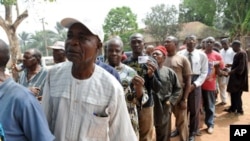Elections in Nigeria could now take place in January. The electoral commission head has promised those elections will be more credible than a 2007 vote marked by fraud and intimidation.
Attahiru Jega took the helm of Nigeria's electoral commission this June with less than one year to organize staggered presidential, parliamentary and local government elections.
Elections were originally set to take place by April, but Nigeria's Senate voted this week to move elections up to January.
Jega said Thursday that the tighter timeline heightens difficulties for what was already a challenging agenda of electoral reform, particularly when it comes to the voter list.
"Without an amendment to the existing electoral act, it will be very, very difficult," said Jega. "The best we can do is to attempt to clean up the existing voter's register, but that existing voter's register has very serious questions of credibility. We would rather not go that route. We would prefer to do fresh voter registration."
The House of Representatives will vote on the changes to the electoral timeline next week.
Jega said the commission has requested more time from legislators. He said it would like four months to work on the voter list.
"If the resources are made available to us, within those four months we will be able to do not a perfect voter registration process but a qualitatively much, much more improved process and we will have a register that we can now say is a good foundation for free and fair elections in Nigeria," said Jega.
Ballot-stuffing and voter intimidation undermined Nigeria's 2007 elections.
Jega said the commission has been examining previous elections to avoid potential pitfalls and develop strategies to "reduce electoral malpractice to the barest minimum."
"God willing, we will have free, fair and credible elections in this country, and at the minimum we will have elections that will be substantively better than the ones we have had before. So I see it as a challenge. It is a formidable challenge, but I believe that in spite of the difficulties associated with the job, it is a possible thing to do and it is possible to attain that goal of free, fair and credible elections," he said.
President Goodluck Jonathan made electoral reform a top priority when he assumed the presidency in May after the death of President Umaru Yar'Adua. Mr. Jonathan has declined to say if he will run in the election.
Nigeria's Electoral Commission Head Promises More Credible Elections




